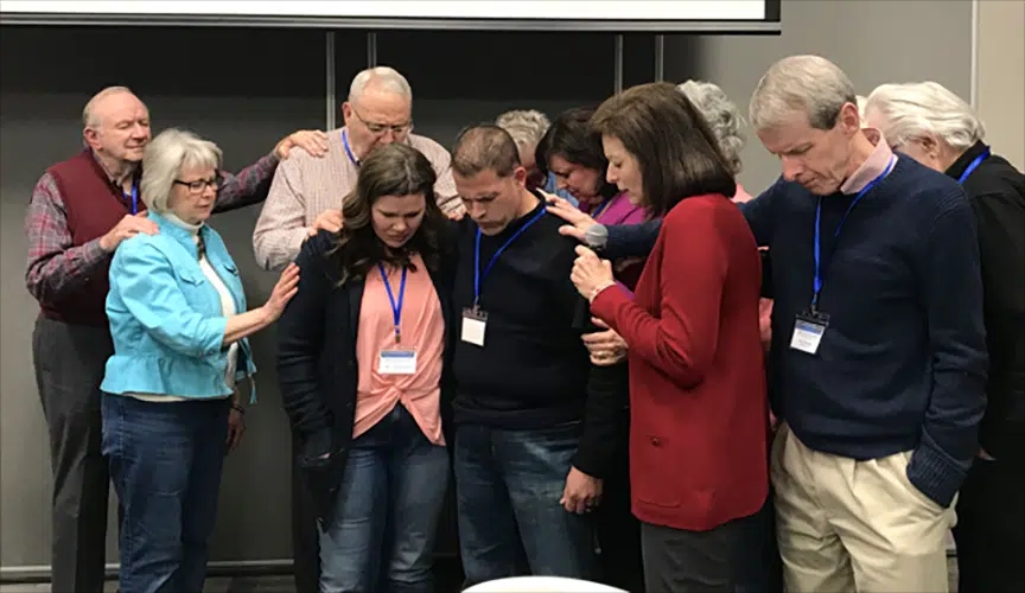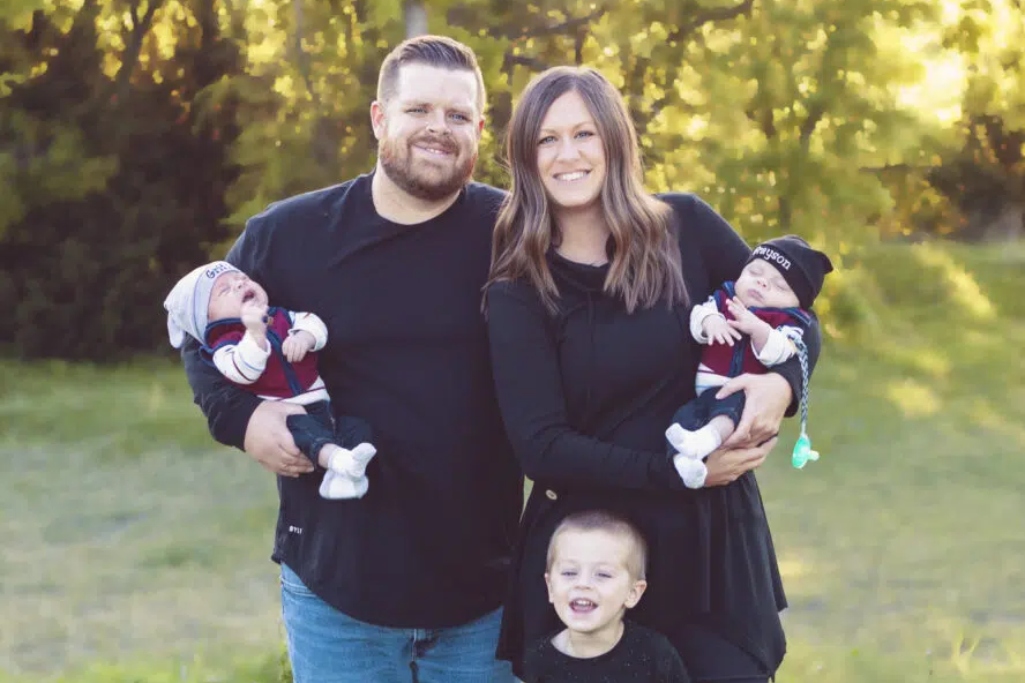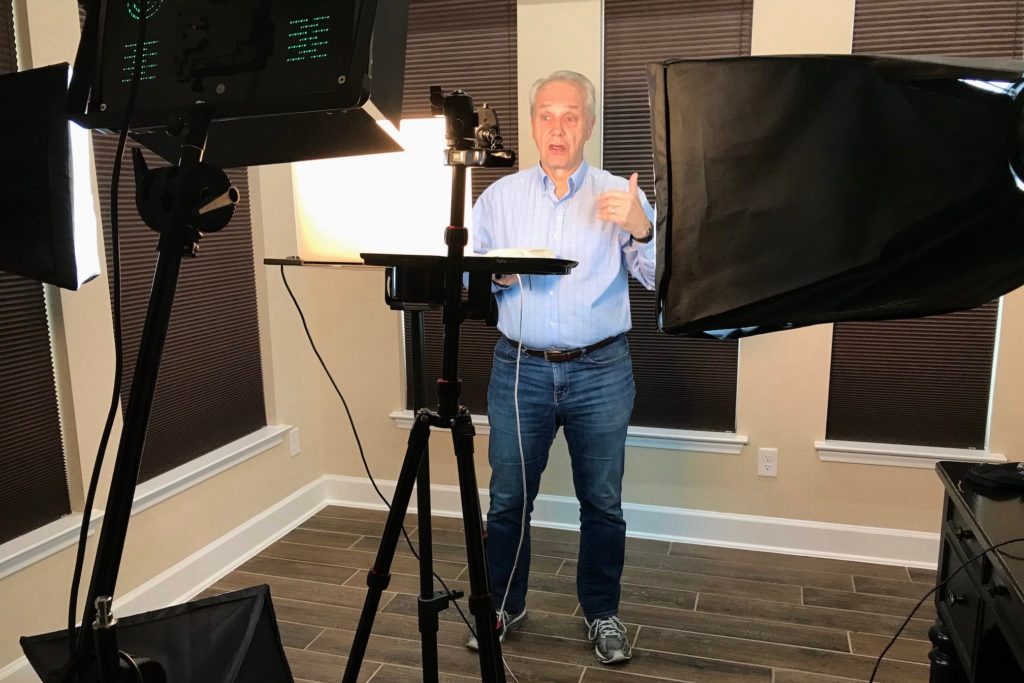
Longtime members of the SBE fellowship group pray over younger-generation evangelist Kolby King and his wife, Mary Beth, at a 2019 Oklahoma Evangelism Summit.
At least 15 Southern Baptist evangelists have died within the last 10 years.
The list, according to the Southern Baptist Evangelists (SBE) fellowship group, includes Roy Fish in 2012; Freddie Gage and Larry Walker in 2014; Rick Ingle, 2015; Gene Williams, Sam Cathey and Vernon Stephenson, 2016; Billy Graham, Leon Westerhouse, Tom Cox and Ron Herrod, 2018; Bailey Smith, 2019; Joe Allbright and Joe Murray, 2020; and Eddie Middleton, 2021.
The remaining 62 members of SBE actively look for the next generation of evangelists “through personal contact, mentorship, one-on-one relationships and encouragement,” Amy Stockwell told the Texan recently. The high-soprano vocalist and her preaching husband, David, from Katy are both long-time members of SBE and members of Second Baptist Church in Houston.
“The worth and work of the evangelist—a unique and specific calling in the body of Christ—is rarely taught, encouraged or presented in our churches, colleges and seminaries as a calling to ministry that has validity, priority or importance,” Stockwell said. “It is vital that we as Southern Baptists decide that God’s priorities in this area should also be our own. It is our responsibility to win people to Christ, but also to train them to reach others with the gospel, and to teach, train, encourage, equip, support and send out the next generation of God-called evangelists.”
Preston Nix, professor of evangelism and evangelistic preaching at New Orleans Baptist Theological Seminary, said that while pastors are shepherds of one flock, evangelists “have a passion for souls but also a passion to train others how to ‘draw the net’ or lead people to faith in Christ.
“Also, as recorded in the book of Acts and throughout Christian history, evangelists tend to want to go where people have not heard the gospel message. They want to give everyone an opportunity to be saved,” he added.
While pastors receive income from the church and perhaps one or more other sources, “evangelists have to build a base of support and become ‘experts’ at all aspects of ministry and business, build a board and put together functioning ministry offices,” Stockwell said. “This takes a great deal of money for staff, travel expenses, living expenses, health insurance and more.”
International evangelist and Southern Baptist Sammy Tippit of San Antonio agreed.
“In many ways it’s harder to be an evangelist than a pastor,” said Tippit, now in his 51st year in vocational evangelism. “It requires solid faith, trust that God will provide everything from finances to speaking engagements to effectiveness in ministry and to a spiritually, mentally and physically healthy family.”
Tippit suggests the new evangelists he mentors first set up as a 501c3 non-profit, with a board of directors for ideas and accountability. His core group has been with him for at least 30 years.
“Combining the board’s and Sammy’s ideas has been very helpful,” Tippit said. “We have the kind of relationship that enables me to receive them when they speak into my life honestly and truthfully.”
Who are some of those God has called out more recently in this field?

Ryan Fontenot

Garrett Wagoner, his wife, Rachel, and their sons.
Ryan Fontenot, 45, a member at Baptist Temple Church in McAllen, Texas, started RAGE Ministries in 2003, an acronym for Reaching a Generation Endangered. Reared in church and a Christ-follower since age 18, Fontenot was 27 when he responded to a call to vocational evangelism during Amsterdam 2000, a nine-day conference for preaching evangelists he’d unexpectedly been invited to.
“We go after the next generation, Gen Z,” said Fontenot, who serves as personal and event evangelism consultant for the Southern Baptists of Texas Convention. “We preach the gospel and we prepare the next generation to do the same.”
Gen Z refers to middle school and high school students. Fontenot leads weekend conferences, camps and ministers online, as well.
“We partner with churches, associations, camps [and] conferences. Sometimes I’m there to give the gospel; other times it’s [about] how to share their faith,” he said. Fontenot usually is invited to nine camps during the summer and about 25 other engagements throughout the year.
“It’s a passion of ours,” Fontenot said of his family, which includes his wife, Heather, and their three children. “If we don’t tell the generations after us about Jesus, well, they’re the real endangered species in the world.”
Garrett Wagoner has served in ministry for 18 years, the last two as discipleship pastor at Fivestone Community Church in Garland. Last year, Wagoner responded to a call to full-time vocational evangelism despite the fact he and his wife, Rachel, are parents to one-year-old twins and a four-year-old, all boys.
“I had a good friend, a vocational evangelist, who died of COVID,” Wagoner said. “We’d have conversations years before about my passion, my desire, for telling people about Jesus. The day he died God started stirring my heart. The Lord made it very clear: ‘The time is now.’
“When I preach, I see people respond, a physical response,” Wagoner said. “Over time I realized I always wanted to be intentional in sharing the gospel, giving an invitation when I preach.”
His pastor, Jerry Zucha, and Fivestone’s leadership team recognized his evangelistic giftedness, encouraged him to pursue vocational evangelism and gave him a launch plan.
“The Lord has blessed [us],” Wagoner said. “We’re living on faith and we haven’t missed a meal. He’s given us a full schedule through spring.”
Wagoner is setting up a donor/partner team, he’s in the process of legalizing his 501c3 non-profit status and he’s “learning how to run the non-profit with integrity, in a way to honor God.
“And as evangelists, we’re there to encourage leaders, so I’m learning the ins and outs of that, too,” he added. “God has brought the right people around us to help us.”
Wagoner preaches in churches, at camps and at youth events. With 57 million teens who don’t have a relationship with Jesus, there is a great need for people to respond to God’s evangelistic call on their life by walking faithfully with Jesus, serving in their local church and in God’s timing and surrendering to full-time ministry, Wagoner said.
“If you think about lost people all the time, think about how you can get them to respond to the gospel, and want to train others to share their faith, to mobilize believers to articulate the gospel to people in their lives, then God is probably calling you into full-time evangelism,” Wagoner said. “Pray about it. Read John 15, Ephesians 4. Find mentors.
“What we’re seeing is a hunger for God’s word,” the evangelist continued. “They respond to authenticity. They’re hungry for the truth. Engage them with stories of your life that connect with scriptures and they respond.”
(EDITOR’S NOTE – Karen L. Willoughby is a correspondent for the Southern Baptist Texan.)

